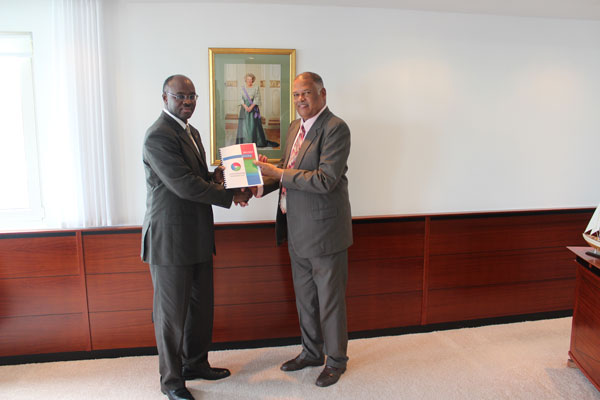 The Social Economic Council of Sint Maarten, one of the institutions connected to the country status, concluded its first year of operations by presenting its annual report to Governor Eugene Holiday.
The Social Economic Council of Sint Maarten, one of the institutions connected to the country status, concluded its first year of operations by presenting its annual report to Governor Eugene Holiday.The Social Economic Council was officially established in May of 2011, three members being nominated by the main labor unions and the same number by the business community of Sint Maarten, its tripartite composition completed by three government appointed impartial experts. Currently, nominees of the SHTA and the Chamber of Commerce are represented in the SER, joined from the side of organized labor by WIFOL, UFA and WICSU. Independent experts are René Richardson, who is also chairing the council, Dwight Williams and Elaine Gumbs-Vlaun.
The main goal of the SER is to advise government on policies and draft laws in the social economic field, such as labor laws, the minimum wage and business regulations. Government is under obligation to request SER advice on main economic issues and laws, however, the SER is entitled to provide government with unsollicited advice when this is deemed necessary.
The SER annual report covers the starting up and first efforts of the social economic council during 2011 and early 2012. The first advice produced by the council dealt with the intention of government to institute the first of July as official holiday or 'Emancipation Day' in commemoration of the 1863 abolition of slavery in the Kingdom.
While the council itself saw well-attended meetings during the year 2011, the support staff was gradually recruited, resulting in a fully operational secretariat as of March, 2012. In the meantime, during the period under report important international connections with similar organisations were forged on the level of the council as well as the secretariat with working visits to Curaçao, Aruba, the Dominican Republic and within short to Brazil and the Netherlands.
The coming year will undoubtedly see an increase in the SER core task which is advising the political executives, while it is the intention of the SER to publicize their products and let the general public share in the efforts and products of the council.












